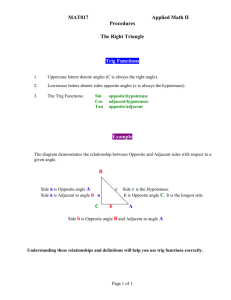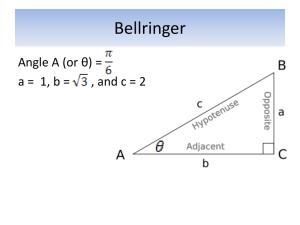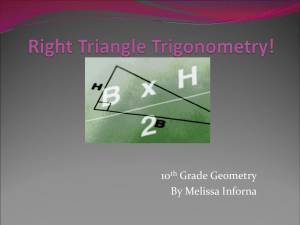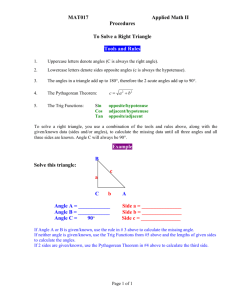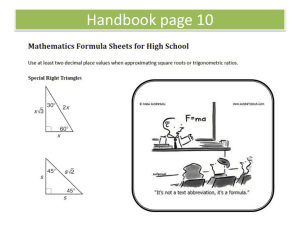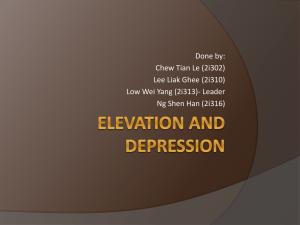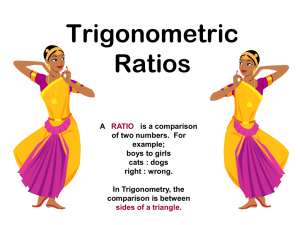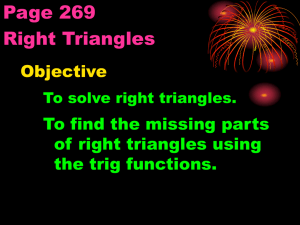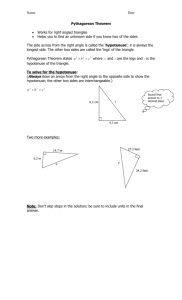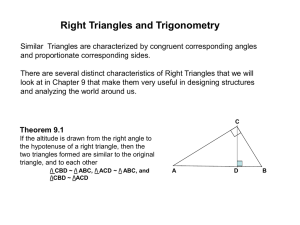Integrated Algebra B
advertisement
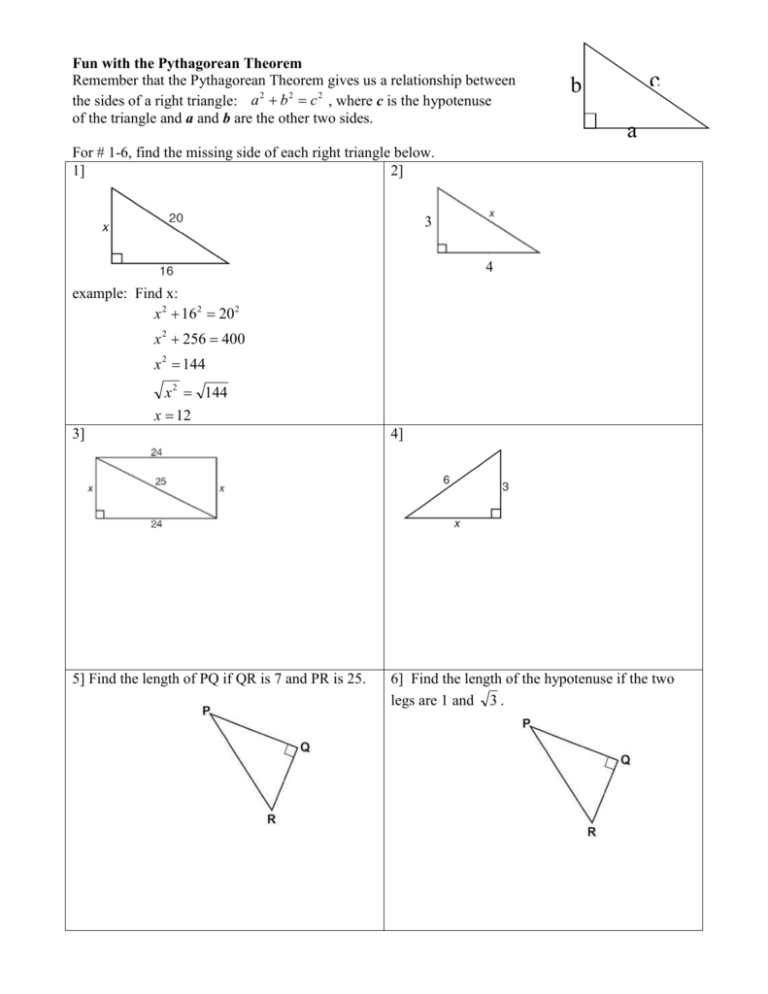
Fun with the Pythagorean Theorem
Remember that the Pythagorean Theorem gives us a relationship between
the sides of a right triangle: a 2 b 2 c 2 , where c is the hypotenuse
of the triangle and a and b are the other two sides.
c
b
a
For # 1-6, find the missing side of each right triangle below.
1]
2]
3
4
example: Find x:
x 2 162 202
x 2 256 400
x 2 144
x 2 144
x 12
3]
4]
5] Find the length of PQ if QR is 7 and PR is 25.
6] Find the length of the hypotenuse if the two
legs are 1 and 3 .
Introduction to Trigonometry
Name:
What is trigonometry? Trigonometry (from Greek trigōnon "triangle" + metron "measure") is an ancient
and very useful branch of mathematics that relates the SIDES of a triangle with the ANGLES of a
triangle.
Trigonometry is incredibly useful for determining heights of mountains, finding distances across lakes,
surveying land, determining the height of tides, finding the distance between planets, and modeling sound
waves, to name just a few examples. Trigonometry is also used in music theory, architecture,
engineering, astronomy, and in many other fields. This list could go on and on! Ms. Stewart used
trigonometry when she built a deck on her house to get all the measurements and angles right!
On the other side of this worksheet, we used the Pythagorean Theorem to find a missing side of a right
triangle when given the other two sides. Now we will use trigonometry to find a missing side or angle
when given a side and an angle or when given two sides of a right triangle. We will need to develop three
trigonometric ratios: sine, cosine, and tangent, which are abbreviated sin, cos, and tan.
Look at the diagram at the right. If we use angle A as our reference angle, then we can
identify the sides that are adjacent (next to) that angle, the side that is opposite that
angle, and the hypotenuse (which is always the longest side).
x
7) Label the sides adjacent, opposite and hypotenuse
using x as the reference angle.
8) Label the sides adjacent, opposite and
hypotenuse using x as the reference angle.
x
x
9) Label the sides adjacent, opposite and hypotenuse
using angle R as the reference angle.
10) Label the sides adjacent, opposite and
hypotenuse using angle P as the reference
angle.
Look at the diagrams that follow and see if you can discover how the ratios sine (sin), cosine (cos), and
tangent (tan) work. (Assume all the triangles are right triangles.)
11) Label: adjacent, opposite and hypotenuse
12) Label: adjacent, opposite and
hypotenuse
13) Label: adjacent, opposite and hypotenuse
14) Label: adjacent, opposite and
hypotenuse
15) Label: adjacent, opposite and hypotenuse
16) Label: adjacent, opposite and
hypotenuse
Trig Ratios:
sin A =
cos A =
where A represents the reference angle.
tan A =
17) Express each ratio as a fraction in lowest terms
sin A° =
sin B° =
cos A° =
cos B° =
tan A° =
tan B° =
18) What happens if you are given an angle and only one side and asked to find a different side? Try
setting up the ratio you would use to find the missing side:
a)
b)
Steps: to set up trigonometric ratios:
1st __________________________________
2nd __________________________________
3rd __________________________________
4th __________________________________
Examples: Set up the trigonometric ratio used to find the missing quantity:
19)
20)
21)
22)
23) A 15 foot ladder is placed on the side of a
building. The ladder makes an angle of 71° with
the ground. Find the trig ratio you would use to
find how high up the wall the ladder will reach.
Show work here!
Practice: set up the trig ratio used to solve for the missing quantity:
24]
25]
26]
27]
28]
29]
30]
Word problems: Draw a picture for each scenario and set up the problem. We’ll learn how to solve these
next class.
31] An airplane rises at an angle of 12° with the ground. Set up the trig ratio you would use to find the
distance it has flown when it has covered a horizontal distance of 1700 feet.
32] Michael and Jarrett are building a ramp for performing skateboard stunts. The ramp is 7 feet long and
3 feet high. Set up the trig ratio you would use to find the measure of the angle, x, that the ramp makes
with the ground.
33] A surveyor needs to determine the distance across the pond shown in the accompanying diagram.
She determines that the distance from her position to point P on the south shore of the pond is 175
meters and the angle from her position to point X on the north shore is 32°. Set up the trig ratio you
would use to determine the distance, PX, across the pond.
Trigonometry Mixed Practice 1
Name:
Given that triangle ABC is a right triangle with hypotenuse c, find the missing length to the nearest tenth:
1) a = 12, b = 11, c = ?
2) a = 8, c = 22, b = ?
Word problems:
3) A building 14.5 m tall casts a shadow of 11.4 m along the level ground. At what angle do the rays
of the sun hit the ground? (Just set up the problem. We’ll learn how to solve it next class!)
4) Victor’s dog house is shaped like a tent. The slanted sides are both 5 feet long and
the bottom of the house is 6 feet across. What is the height of his dog house, in feet, at
its tallest point? (Just set up the problem; don’t solve.)
Set up the appropriate trigonometric ratio for each triangle. DO NOT SOLVE!
5]
6]
7]
8]
9] A 5.2 m ladder leans against a wall. The bottom of the ladder is 1.9 m from the wall. What angle
does the ladder make with the ground? (Draw a picture and set up the problem; don’t solve.)
10] Which of the following is a rational number but not an integer?
(a)
12
(b)
11] Simplify the expression:
3
7
(c)
15
3
(d)
6
38
12] Universal set ={All fruit}
A = {apples, bananas, oranges, grapefruit, peaches}
B = {lemons, peaches, apples}
A B
A B
A
